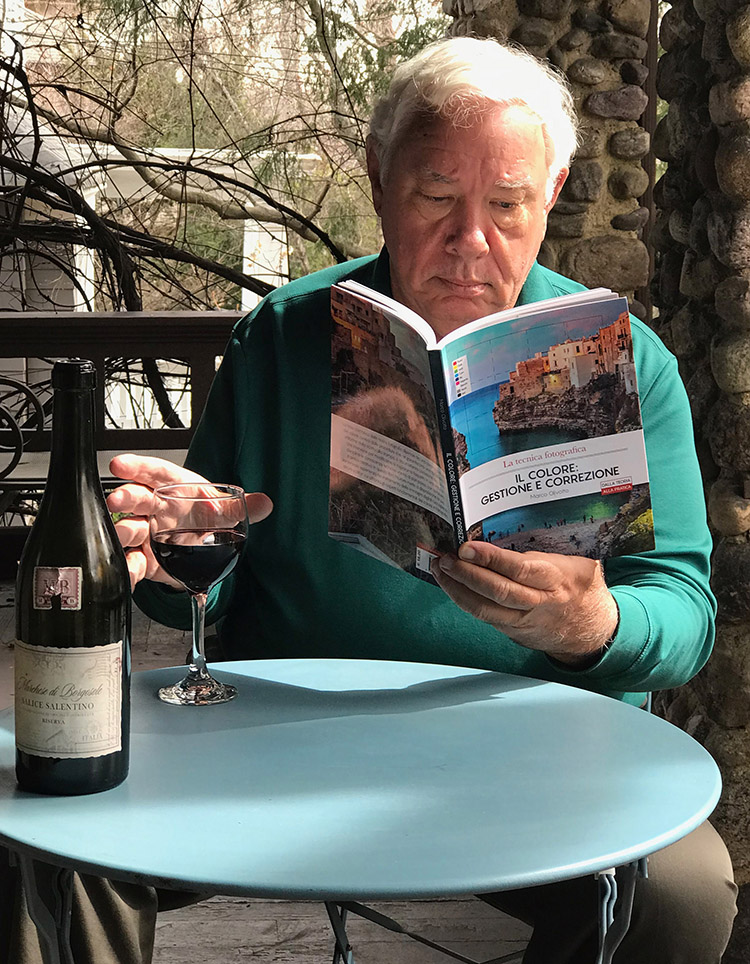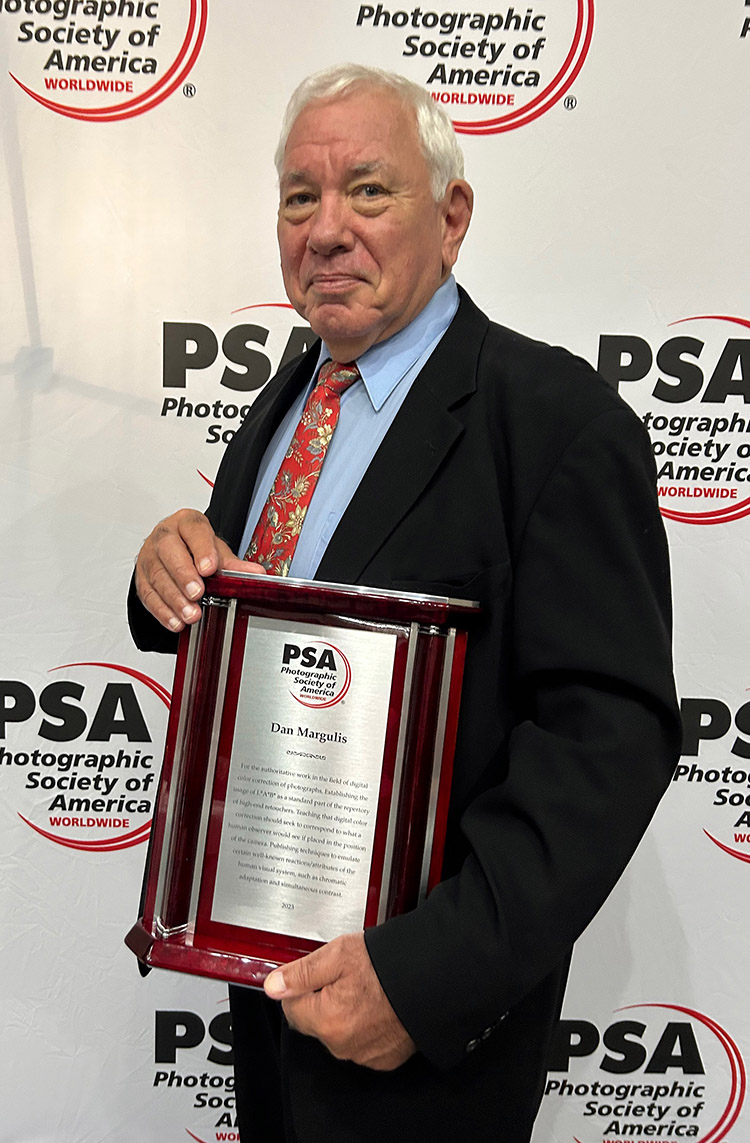My retirement was interrupted last month by one of my life’s happier experiences. In Williamsburg, Virginia, I accepted the Progress Award for 2023 from the Photographic Society of America.
PSA has been around for 84 years and is likely the most prestigious such organization in our field. They state, “The Progress Award recognizes a person who has made an outstanding contribution to the progress of photography or an allied subject. The recipient does not have to be a member of the Society. The Progress Award, PSA’s highest award, is presented each year…”
This is a rather exclusive group that I just joined. Among previous recipients are Ansel Adams, Tim Berners-Lee, Ken Burns, Jacques-Yves Cousteau, Walt Disney, Alfred Eisenstaedt, Adolf Fassbender, Victor Hasselblad, Edwin Land, and Henry Luce.
My brief acceptance speech posed a small problem. As in Oscar ceremonies, the other people who received lesser awards had a list of people to thank. I couldn’t, because the list would be way too long. So, with apologies for the length of the post, I’ll do it here.
The piece of hardware that I’m holding cites me “For the authoritative work in the field of digital color correction of photographs. Establishing the usage of L*A*B* as a standard part of the repertory of high-end retouchers. Teaching that digital color correction should seek to correspond to what a human observer would see if placed in the position on the camera. Publishing techniques to emulate certain well-known reactions/attributes of the human visual system, such as chromatic adaptation and simultaneous contrast.”
I wasn’t consulted about that inscription, so they must have done some research. Another thing that was researched, and discussed at some length, was the fact that my final four books before Chevreul had panels of beta readers. This may have been a reaction to another controversy. Apparently many of their competitions have the same judges, who can bring the same set of biases each time. It was announced that henceforth there is going to be some system of rotation of judges who may have different perceptions.
So the question came up as to how I knew each group of beta readers offered a broad enough spectrum of experiences. I produced the questionnaire that I would post to my Applied Color Theory list before selecting the group. And I explained that I would usually get 50 or 60 responses, which I would spreadsheet, and whittle it down in a way that preserved diversity. This procedure ensured I had some of everything: non-experts as well as experts; people who did not know me and others who did; people with backgrounds in art, in science, in writing, or teaching, people whose work ends up in CMYK and those who end up with RGB; people whose first language is not English, etc.
AFAIK I’ve never listed all the beta readers who have meant so much to the quality of what I’ve published. I reiterate that it was a great honor to have so many volunteers, because the beta reading program required scores of hours from every participant. Before listing them, however, I want to thank some others who were not beta readers as such but have made an extraordinary contribution to my career and teaching. In alphabetical order, I tip my hat to:
*Giuliana Abbiati. Everyone who has ever used the PPW panel is in her debt, as am I. Her dedication to our field, and particularly to development of innovative tools, is extraordinary.
*Gerald Bakker. Just this week he posted another in his series of actions that represent a continuation of what the PPW panel’s suite of actions started. As a full slate of beta readers wasn’t feasible for the Chevreul book, he was the one who gave the manuscript the most careful read prior to publication. And, of course, his work in moderating and participating in this list benefits everyone.
*Daniele Di Stanio has done much of the behind-the-scenes work in promotion, the development of our site, as well as his own fine one on color correction.
*Sterling Ledet is the unstoppable energetic force behind my ACT classes, my books, and the ACT list. We have been close friends for 30 years. Without his contribution, you would likely never even have heard of me.
*Clarence Maslowski. I know that I said I wasn’t going to list beta readers except as an entire group, but only one person was a beta reader for all four titles (PP5E, both editions of Canyon Conundrum, and MPCW). Furthermore, his criticism was less diplomatic than that of others, which was probably helpful because he had a knack of pointing out serious flaws.
*Cathy Panagoulias. Living with an author who is on deadline is no picnic, particularly when the author is prone to do his best writing in the middle of the night, and even more so when the author is not one to suffer fools. Cathy supported me throughout, was the ultimate reader of all these books before they were published, and was even recognized by PSA, which invited her by name, instead of merely “Dan Margulis and Guest”.
And now the readers; the number in parentheses is shown when the individual participated in more than one title.
 Alessandro Bernardi, Italy (2); Russell Brown, Australia; Bevi Chagnon, United States; M.E. Chevreul, France; the late Les De Moss, United States (2); Mike Demyan, United States (2); Fred Drury, United States; André Dumas, Canada (2); Adriano Esteves, Portugal (2); Bruce Fellman, United States (2); James Gray, United States (2); George Harding, United States; John Jacobs, Canada (2); the late Timo Kirves, Finland; Katia Lazarova, Bulgaria; André Borges Lopes, Brazil; George Machen, United States; Clarence Maslowski, United States (4); Clyde McConnell, Canada (2); Marco Olivotto, Italy (2); John Pavel, United Kingdom (2); John Ruttenberg, United States; Kevin Stecyk, Canada; Nick Tressider, New Zealand; Campo Weijerman, The Netherlands; Frederick Yocum, United States.
Alessandro Bernardi, Italy (2); Russell Brown, Australia; Bevi Chagnon, United States; M.E. Chevreul, France; the late Les De Moss, United States (2); Mike Demyan, United States (2); Fred Drury, United States; André Dumas, Canada (2); Adriano Esteves, Portugal (2); Bruce Fellman, United States (2); James Gray, United States (2); George Harding, United States; John Jacobs, Canada (2); the late Timo Kirves, Finland; Katia Lazarova, Bulgaria; André Borges Lopes, Brazil; George Machen, United States; Clarence Maslowski, United States (4); Clyde McConnell, Canada (2); Marco Olivotto, Italy (2); John Pavel, United Kingdom (2); John Ruttenberg, United States; Kevin Stecyk, Canada; Nick Tressider, New Zealand; Campo Weijerman, The Netherlands; Frederick Yocum, United States.
I deny that any one individual named above had more impact on the final product than I did myself, but the group as a whole surely did.
I ended two of my presentations with a photo of myself on my porch, drinking a bottle of Italian red while practicing my Italian by reading Marco Olivotto’s recent book on color correction. This was a leadup to my final image. I said when I was done reading it, it would go to a place of which I showed a photo. It’s a bookshelf containing thirty-some-odd books written by my students, the candidates for future Progress Awards.



{ 1 comment… read it below or add one }
Congratulations, Dan (if I may). A wonderful cap to a legendary career of giving, giving, giving.
Thank you, e Salute!